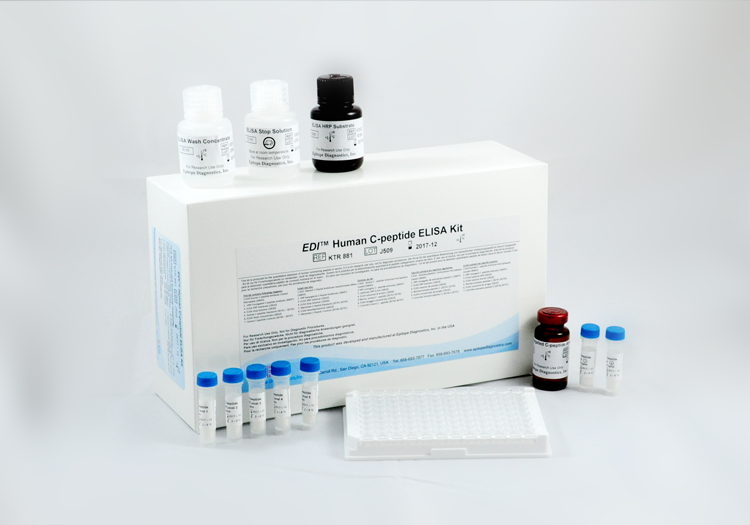Ultra Sensitive C-Peptide ELISA Kit
Description
This human C-peptide ELISA kit is intended for use in the quantitative determination of low picogram levels of human connecting peptide in serum and/or plasma.
This ELISA kit is for in-vitro diagnostic use.
Background
C-peptide is a small 31-amino acid peptide usually produced in beta cells of the pancreas as a byproduct of the cleavage of proinsulin during the synthesis of insulin. Proinsulin consists of A and B chains and a connecting peptide in the middle, called C-peptide. It is generally found in equimolar amounts equal to insulin in circulation. Since the
half-life of C-peptide is 3-4 times that of insulin, it serves as a useful measure of insulin production in the beta cells of the pancreas.
Testing for C-peptide levels can help find the cause of low blood sugar (hypoglycemia) and aid in distinguishing type 1 from type 2 diabetes. A person with diabetes may have a normal level of C-peptide which indicates the body is making plenty of insulin and simply not responding properly to it. This is the hallmark of type 2 diabetes (adult insulin-resistant diabetes). For patients with type 1 diabetes treated with insulin, measuring C-peptide levels is useful in evaluating beta cell function related to the synthesis and release of endogenous insulin into the circulation.
Some studies have suggested that C-peptide may have chemotactic effects on inflammatory cells and might have a role in increased risk of atherosclerosis in persons with type-2 diabetes.
Related Kits
KT-886 Human Insulin ELISA Kit
Specifications
Catalog no.
Target:
Species
Method
Tests Per Kit
Detection
Sensitivity / LLOD
Dynamic Range
Total Incubation Time
Sample Type
Sample Volume
Storage Temperature
KT-891
C-Peptide
Human
Sandwich ELISA
96 tests
Colorimetric
0.57 pg /mL
0 - 700 pg/mL
2 hour, 20 minutes
serum, EDTA-plasma
100 µL
2-8 °C
For in-vitro diagnostic use.

